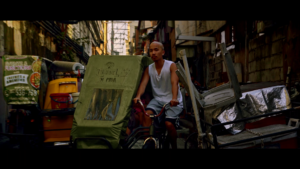The film starts off noisy, the helpless crying of a baby as she yearns to be with her father who is trying to get dressed for the day. The shot is cramped, three members of a family all trying to fit in one scene, all trying to do something different. The wife tries to calm her child, the child is shrieking for her father, and the father is just trying to find a shirt to put on for another day’s work. Claustrophobic and noisy, this already sets the tone and the themes for the rest of the film.
The short film focuses on a cast of different characters but zeroes in on Rodel, a tricycle driver behind on rent, trying to make end’s meet. It is heavily implied that his wife also helps out with the money, being driven to a “customer” as prostitution is normalized in order to get some extra cash. Other characters are also struggling to generate income, one in particular, Amir, is raising money to try and get his wife out of jail. His daughter, Judy, takes care of Rodel’s kid sometimes to make some money, as well.
With the dark coloring and how nonchalant the film expresses the troubles of its characters, there’s a sense of normalcy that washes over the dark realities these characters face. Prostitution, having to contend with prison, the possibility of having to sell drugs, all of these things are discussed in a casual manner by its characters. They’ve normalized these conversations, and the grittiness of it all being dealt with so lightly sends a chill down the spine of the viewer.
The film wastes no time in its 15 minutes, weaving together a chilling story of risk and loss without a second lost. And even then, when faced with grief and violence, Rodel must continue pedaling on even when his wife, distraught, asks him: “Kaya mo pa ba?” He says yes even in his current state and takes on a customer to bring her to the church, his face set straight on to his next destination as if nothing terrible had just occurred. Money needs to be made, after all, ends have to be met, and, as the film establishes earlier on, rent has to be paid.
Nothing about the film feels artificial, made-up, or held-back these characters’ endurance in the face of squalor feels real and lived out. The actors did a fantastic job bringing out the film’s gritty writing and direction, Rodel’s stare at the very end a testament to how dedicated Nikko delos Santos is to his role.
Overall, Tarang is a movie that displays the harsh realities of the slums and how they carry on despite the difficulties they face. It doesn’t hold back on its horrors and how they’ve become a habit to these characters. It’s heartbreaking, the claustrophobic and noisy life of the slums feeling as choking as every shot makes it out to be.
Catch Tarang and other Cinemalaya films here before August 16.





